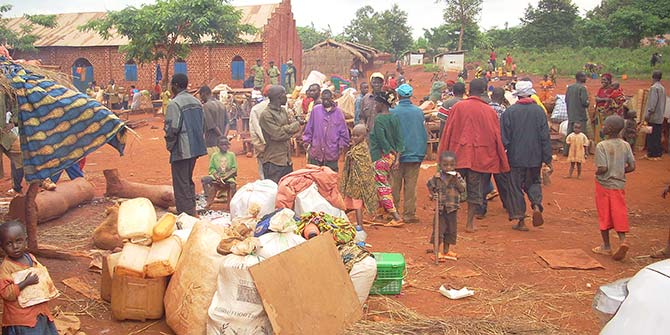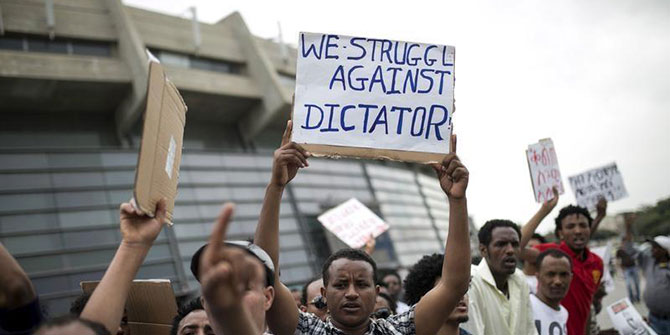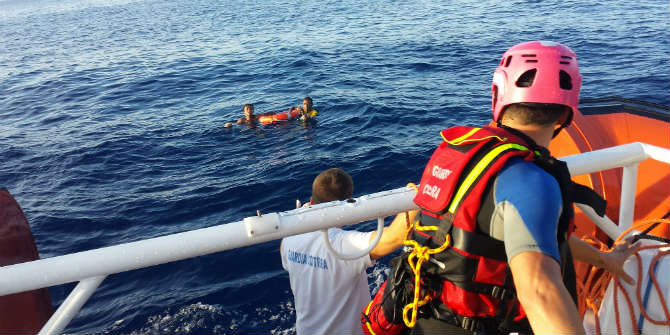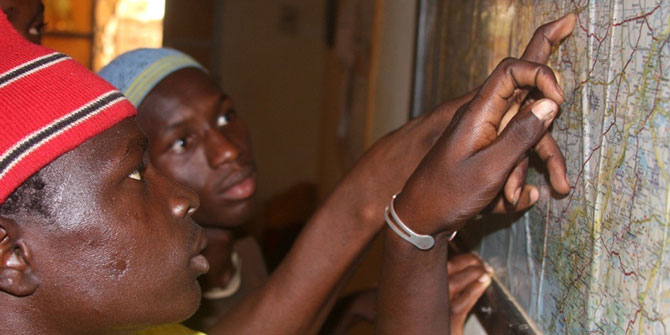Yohannes Woldemariam argues that European leaders could learn from Uganda’s compassionate policy towards refugees.
The distinguished scholar and humanitarian activist Noam Chomsky places Western attitudes towards refugees “among the signs of the severe moral-cultural crisis… that is mislabelled a ‘refugee crisis.’” According to the latest report of Amnesty International:
Measures implemented by EU leaders to strengthen search and rescue capacity in the central Mediterranean in April 2015 dramatically decreased deaths at sea. But this priority, which saw several countries provide more rescue boats closer to Libyan territorial waters, was short-lived. Instead, EU governments have shifted their focus to disrupting smugglers and preventing departures of boats from Libya: a failing strategy that has led to ever more dangerous crossings and a threefold increase in the death-rate from 0.89 per cent in the second half of 2015 to 2.7 per cent in 2017.
This “failing strategy” confirms Chomsky’s observation that what is occurring along the central Mediterranean is actually more of a Western moral crisis than a refugee crisis and that racism is the underlying cause. Can you imagine this being the case if the ones needing to survive were Europeans? Libya, Egypt and Sudan are places where refugees are subjected to degrading treatment, extortion, extreme abuse and slavery as they are tortured, raped and murdered. In Egypt, organ harvesting from kidnapped refugees involving doctors and medical professionals is a thriving business. In Libya, ISIS has beheaded Christian refugees from Eritrea and Ethiopia. The yet-to-be-told story is that of refugees victimised and enslaved out of sight in the deserts of Libya and in Sinai Egypt. The prevailing strategy of the EU in dealing with these countries to deter refugees manifests a deep underlying cynicism. To depend on the support of the “Libyan Coast Guard” operating in lawless Libya, controlled by numerous autonomous warlords is tantamount to complicity with criminal gangs. According to a UNHCR study:
[T]he… instability in the country [has] contributed to… an environment where human smuggling and criminal networks flourish. At the same time, the collapse of the justice system and reigning impunity have led many armed groups, criminal gangs and individuals to participate in the exploitation and abuse of refugees and migrants.
When a reporter asked Mahatma Gandhi what he thought of Western civilisation, he famously replied: “I think it would be a good idea”. President Donald Trump has been talking about the defense of western civilisation these days, but where is the evidence for any degree of civilised action in his policies? Precisely because they are the most vulnerable, attacking refugees and the poor has been the distinguishing hallmarks of his presidency thus far. The United States is increasingly a stingy and heartless bystander when it comes to refugees and other vulnerable populations. The United States and Britain are the leading merchants of weapons spearheading military interventions, yet they are hesitant to deal with the clean-up of the mess created by the current refugee exodus from war-torn countries awash with those very weapons. Ben Norton of Salon.com writes:
The five wealthiest countries [the U.S., China, Japan, the U.K. and Germany]— which make up half the global economy — are hosting less than 5 per cent of the world’s refugees, while 86 per cent of refugees are in poorer developing countries that are often struggling to meet the needs of their own people.
The Ugandan Exception
Uganda, on the other hand, through its compassionate policy towards refugees, exemplifies the moral high ground abandoned by the United States under President Trump and earlier even by President Obama. There have been many remarkable testimonies on Uganda’s exceptional reception of refugees. Julian Hattem, writing for the Washington Post, states:
Instead of being locked in crowded camps surrounded by barbed wire, the 1.2 million refugees in Uganda are given large plots of land in sprawling settlements to build homes or, if they like, small farms. If agrarian life isn’t for them, they can move freely around the country, traveling to towns or to the bustling capital of Kampala, which 95,000 refugees call their home.

Photo Credit: Geno Teofilo/Oxfam via Flickr (http://bit.ly/2jnCfBa) CC BY-NC-ND 2.0
Uganda has been hailed by many, including the IMF and the United Nations, for its enlightened refugee policy. But critics say that President Yoweri Museveni of Uganda is a dictator and is using refugees to enhance his stature and to cover up his excesses regionally and domestically. I do not dispute this criticism, but I say not all dictators are cut from the same cloth. For example, Ethiopia suffers under a dictatorship, flouts international law with impunity, but lets in refugees (including highly qualified college graduates) only to warehouse them in camps, while benefiting from the generosity of international institutions and governments by appearing magnanimous towards refugees. Neighbouring Kenya warehouses refugees, while at times threatening to close the Dadaab camp and evicting its Somali refugees under the pretext of security concerns. Therefore, the policy must be understood comparatively within the context of regional and international realities.
We live in a world that is very far from perfect. For example, Fidel Castro was a dictator, but he also built the best medical system in Latin America. In contrast, there is no apparent redeeming quality for the dictator in Equatorial Guinea. We can continue to talk about ethnographic studies and durable solutions and I appreciate the value of these studies when they are done right, but this refugee “crisis” calls for a different conversation. People in the ivory tower may choose to tell a drowning human being about swimming lessons when the very immediate need and task is literally survival. As Foucault writes (in Maladie Mentale et Psychologie, p.45), we must leap “into the interior of morbid consciousness, [trying] to see the pathological world with the eyes of the patient himself.” In the context of the refugee “crisis,” it is necessary to cultivate the quality of empathy that engenders such a strategic intuition.
One needs to realise that the relatively generous policy of Uganda comes at a price, as Bidi Bidi, the largest refugee camp in the world has reached critical mass. Nevertheless, Uganda’s proactive refugee policy remains among the best, if not the best, approach to host refugees. Some refugees in Uganda have found a way to become thriving entrepreneurs and employers. Unfortunately, as much as Uganda’s treatment of refugees has provided a model for how a “civilised” country deals with refugees, many countries in Africa remain a hellish nightmare for African refugees.
Sudan, Libya, Egypt and South Africa are among the most horrific places to be a refugee. Refugees have been burned alive by South African mobs. In the words of a German diplomat in Niger, “the Libyan camps where traffickers hold would-be migrants resemble concentration camps” but with German elections about a month away, Angela Merkel is now advocating support for the activities of the “Libyan Coast Guard.”
For Europe, to try to enter a deal with Libya for outsourcing or containing refugees, as it did with Turkey, is tantamount to complicity in crime, conditions in Libya are comparable to those in Somalia, with violent actors and more lawlessness. There are few liveable options for most refugees in Africa in general and very limited opportunities for resettlement: of the 16.1 million refugees of concern to the UNHCR around the world at the end of 2015, less than one per cent were resettled that year.
Europe and other wealthy countries, in dramatic contrast to Uganda, are increasingly shunning refugees. Europe may pride itself for its respect of universal individual rights but African refugees drowning in the central Mediterranean, off the coast of Libya, has become the new normal. To discourage crossing the Mediterranean, European countries replaced the stronger Italian rescue operation, the Nora Nostrum, with Triton. The Triton operation was expected to complement the Nora Nostrum; instead it replaced it with no clear mission and a stated function of “border management” within 30 nautical miles from the European border. The worry was that the Nora Nostrum was a “pull factor” for refugees from Africa.
The securitisation of border control has gone a step further with NATO launching naval patrols in the eastern Mediterranean. In 2017, Europeans have delegated the Libyan “Coast Guard” to apprehend refugees in boats at sea, forcing them to disembark back in Libya, abandoning them to gangs purporting to belong to the “Libyan Coast Guard”. These gangs have shot at refugees resulting in refugees panicking and drowning. This situation is a logical extension of the “fortress Europe” mentality. There is also little effort to try to integrate earlier arrivals with asylum in Italy and Europe in general. Often, refugees are treated with little dignity as we witnessed in August 2017 in the blatant abuse in Rome, while evicting refugees from a building they had inhabited for as long as five years. Some of the victims were the elderly, pregnant women, children and the disabled. One woman who was physically manhandled by police was fresh out of the hospital after an operation for breast cancer.
European Good Samaritans and their Challenges
In contrast, European citizen humanitarianism in the forms of the ever-exemplary NGO Médecins Sans Frontières (MSF) and Save the Children, and private initiatives by individuals such as the Moroccan-Sicilian, Nawal Soufi, using their mobile phones as a lifeline for refugees in boats braving the Mediterranean. The humanity of ordinary people from the island of Lampedusa is depicted in the film Fire at Sea by Italian director Gianfranco Rosi, which won the Golden Bear prize at the Berlin film festival. It tells the story of the migrant crisis through the eyes of locals.
Ordinary fishermen and other humanitarians have responded humanely during incidents where official ships have left refugees to die to avoid any responsibility. “According to Frontex, the EU border and coastal protection agency, around 40 percent of all rescue operations are carried out by volunteers”. Survivors of one of the worst shipwrecks in recent European history, in which 366 people died on October 3 2013 off the Italian island of Lampedusa, reported that boats nearby did not help. Ironically, NGOs are now under attack falsely accused of enabling smugglers and encouraging refugees to make the dangerous trip across the Mediterranean. MSF and the German NGO Sea Eye’ have suspended their life-saving activities due to conditions put on them by the Libyan Coast Guard and the Italian government requiring compromise on their core principles.
In Europe, attitudes towards refugees are only hardening. Legal as well as physical barriers like razor wire lead to the demonisation of refugees as swarms, infiltrators, criminals, vermin, terrorists and threats to security while refugee desperation only grows. Yet, even the most severe dehumanisation fails to curb irregular migration and only serves to increase the death toll. Human beings continue to do what they need to do to try to survive.
A Europe-wide agreement could humanely define asylum seekers and standardise their legal rights as they seek asylum, but the future is more likely to be additional fences and restrictions as governments face more and more extreme challenges from right-wing political parties. These challenges tend to be acrimonious with blame oscillating between the front-line states (Greece, Malta, Spain and Italy) and non-front-line countries like Austria and France that border Italy, where most refugees first disembark. France neither allows entry for irregular migrants camped out in Ventimiglia, nor are “French vessels carrying migrants rescued in the Mediterranean Sea [allowed] to dock in its ports. The boats dock in Italian ones instead”. Out of frustration, Italy is threatening to “invoke wartime law to let 200,000 migrants head for UK, Germany and France”. In retaliation, the non-front-line countries are threatening to exclude the front-line states from the privileges of Schengen.
At the July 2017 EU meeting in Estonia, responses to the refugee crisis centered on restricting the activities of life-saving work by NGOs and on collaborating with African dictators and the so-called Libyan Coast Guard in order to return refugees into the conditions from which they fled. The focus of the Paris Summit in August 2017 was more of the same with few details. It demands that migrants apply for asylum before reaching Europe. The idea of hotspots in lawless Libya under present conditions is a non-starter. “About half of the more than 90 million euros ($103 million) allotted for the refugee crisis on the Mediterranean route is to be spent on providing the Libyan coast guard with more weapons and training.” Blaming NGOs is in reality a diversion from the inaction and impotence of the European Union. According to a study done by the Forensic Oceanography branch at the University of London:
As long as migrants are forced to resort to smugglers for lack of legal pathways, proactive Search and Rescue at sea will be a humanitarian necessity – whether it is operated by states or NGOs. Only a fundamental re-orientation of the EU’s migration policies to grant legal and safe passage may bring the smuggling business, the daily reality of thousands of migrants in distress and the need to rescue them to an end.
The Way Forward
Uganda with all its flaws points the way forward. Uganda is a wonderful model for compassionate hospitality towards refugees, but the country is reaching breaking point due to increasing demands for civilised accommodation of the large numbers of refugees. Tragically, promised assistance for Uganda from donors during last year’s high-level summit in New York has not been forthcoming. Supporting viable resettlement programs and working towards durable solutions is the only way to help resolve the “crisis.” The use of economic and political leverage to promote human rights and good governance in refugee-producing countries is essential for contributing towards a durable solution. Proactively engaging to settle political conflicts, such as the dangerous proxy war between Eritrea and Ethiopia may be daunting but is badly needed for dealing with root causes.
Meanwhile, creating a safe and legal route for refugees gives the option of having claims processed in countries of first arrival and helps to put the human smugglers out of business. Coupled with this, sponsoring massive educational and media campaigns in refugee camps about the hazards of journeys across the deserts of Libya, Sinai, Sudan, Yemen and other routes taken by refugees is essential. At present, increasing life-saving rescue operations in the Mediterranean is the right thing to do. Wheeling and dealing with the dictators, who are the very reason for these flights is cruel – and uncivilised.
Dr Yohannes Woldemariam is a former refugee who has been writing on refugee issues. He can be reached at: yohannes99@hotmail.com.
The views expressed in this post are those of the author and in no way reflect those of the Africa at LSE blog or the London School of Economics and Political Science.






How is this a ” failing” strategy?
http://reliefweb.int/report/world/eu-migration-policy-delivering-results-thanks-partnership-approach-and-investment
Thank you for writing about this! I just finished a MA course on the global refugee challenge and this was one of the big shocks that I discovered. I’ll look forward to finding more of your writing.